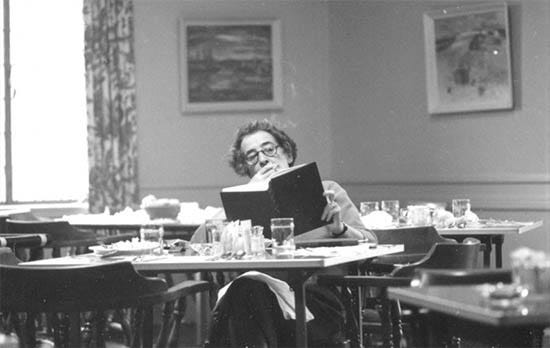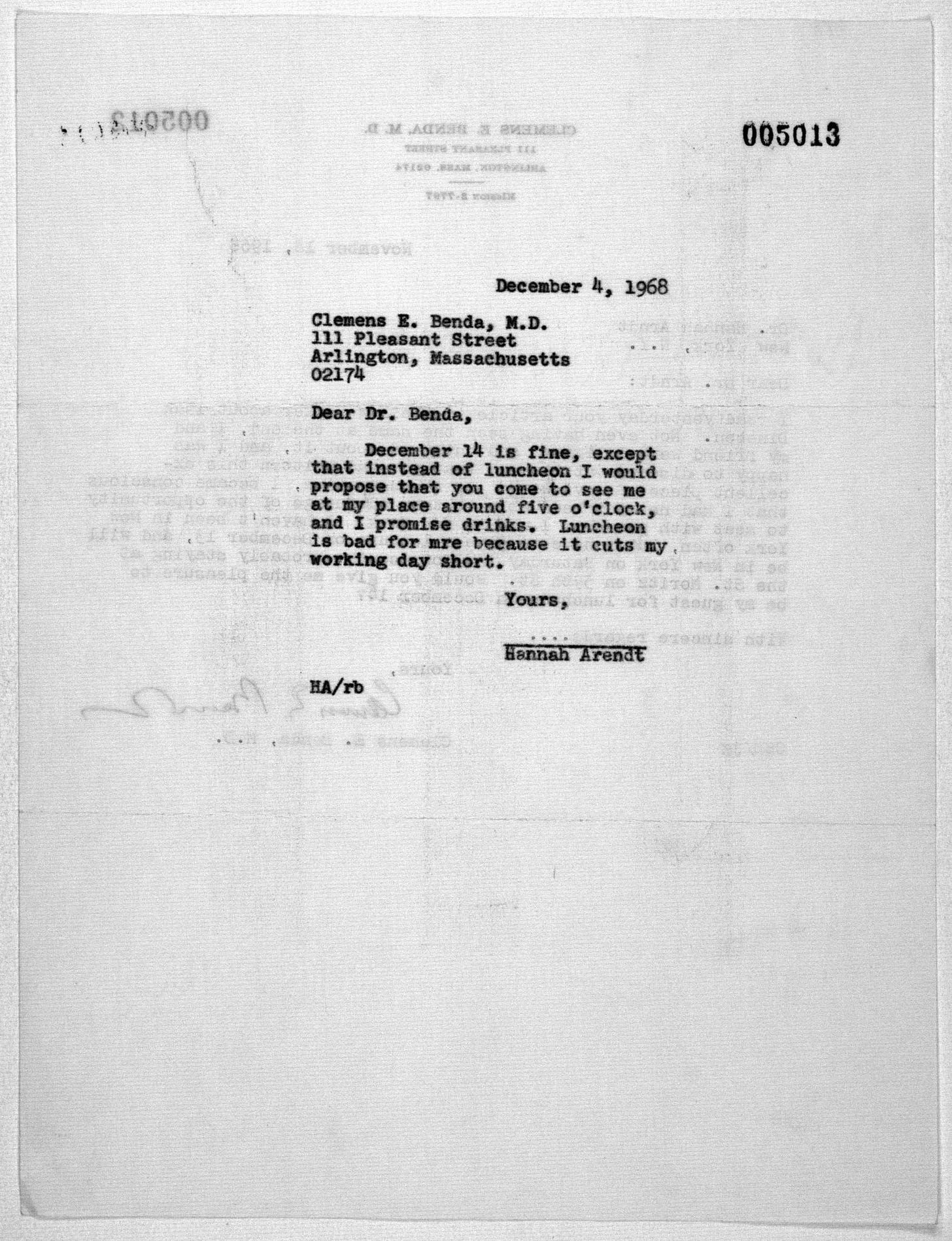I have always been awed by Hannah Arendt’s ability to say “no.” She ferociously guarded her time, saying no to trips to Mexico, offers to write books, essays, introductions, lunch dates, dinner dates, student requests for letters of recommendation.
Yesterday while I was looking for a letter, I stumbled across a correspondence she had with her friend Hans Jonas about teaching at the New School for Social Research. When she accepted the Gifford lectures, she told him that she would have to reduce her teaching schedule to one seminar per semester to the subject material for the lectures.
Because of historical circumstances, Arendt’s productive years came later in life. Between 1951 and 1972 she published 12 books in German and English, edited several volumes and countless articles like Truth and Politics and Lying in Politics. She was so prolific, I wager, because she understood the importance of solitude, guarding her private space, and knowing how to prioritize.
We can piece together Hannah Arendt’s daily routine from her letters, diaries, and correspondence. She woke up fairly late (by my standards at least), enjoyed a quite morning with several cups of coffee and a large breakfast, and then worked until about 5:00 o’clock. Evenings were for socializing, drinks, dinners, and occasionally a show. In her interview with Günter Gaus, Arendt says that she didn’t write until she could take dictation from herself:
Solitude was an essential part of Arendt’s writing process. When she was finishing her first major work, The Origins of Totalitarianism, she went to Hanover, New Hampshire for the summer to focus on writing. As she was working on The Life of the Mind she rented a room at the Casa Barbatè in Tegna, Switzerland. In Walter Benjamin’s rules for writing, he advises that one should never finish a work in a familiar place, and it seems Hannah Arendt agreed with him.
The other side of solitude, aside from the social isolation which is sometimes necessary to engage in creative acts, is privacy. Privacy for Arendt was spatial, she described it as the four walls of the home, but it was also a state of mind and a way of being. In a space of privacy one can freely be themselves, away from the glare of public light. Arendt refused to give autographs when asked because she didn’t desire to be famous in that way. Her work wasn’t motivated by a desire for public recognition, it was motivated by a desire for understanding. “A life spent entirely in public, in the presence of others,” she writes, “becomes, as we would say, shallow."
In addition to protecting her privacy, Arendt also understood the art of prioritizing. She organized her teaching around the bibliography for whatever it was she was working on. She wasn’t able to write while she was teaching because of the time pressures, but she was able to read and organize lecture materials that would later become part of her written work. None of the courses she taught were extraneous to her publications. And when the semester was over, she severed her teaching obligations and let her students know she was away. Arendt knew that people will take as much of your time as you let them.
Of course, each of these things—solitude, privacy, and prioritizing—require certain means, sacrifices and tradeoffs. For Arendt it meant finding daily stability in her personal relationships with her husband and friends, instead of in her career. It meant long stretches alone with nothing but her thoughts and correspondence. And it meant disappointing other people. In On Revolution Arendt reflects that people will always choose bread over freedom, but Arendt herself consistently chose freedom when the chips were down.

No price can be placed on securing the inner sphere of freedom. And yet, it is all too easy these days to give it away—to jobs, to others, to social media. It is all too easy to let other people’s demands gobble up our time so that we have none of it left for ourselves. I’ve been thinking about this in quarantine—the demands, the endless demands placed on time and thinking.
A writer friend called me a couple months ago and immediately asked: “Samantha, are you guarding your time? What is your writing routine? How much are you writing? You should be writing for two to three hours in the morning and spending the rest of the day reading and doing your other work.” This writer friend of mine understood what Hannah Arendt meant by solitude: Solitude, privacy and prioritization aren’t just about carving out space and time, they’re about thinking. They are about guarding your thinking so that you can approach your work clearly in what Hannah Arendt called the two-in-one. And the two-in-one conversation that I have with myself is also about boxing out all of the other willy-nilly voices and demands that compromise my ability to think. The two-in-one is about taking control of your thinking and directing it toward what you are consciously thinking about, stepping back from the unmediated flow of consciousness and actively engaging yourself.
No, that doesn’t mean you leave the world, it doesn’t mean that a stray thought won’t appear now and then, it means that when it does you won’t be tempted to follow it down some wild path. Your thinking will be present, focused, and free to play imaginatively. To take dictation from one’s self is a way of transcribing a conversation you have alone in your head. Perhaps you have tried this? Like Plato or Machiavelli, imagined yourself in conversation with someone else, a real or imaginary character, and then carried out a dialogue, or monologue, until you have worked through your thoughts?
No one can live in this space of present thinking endlessly. You’d go mad. But for Hannah Arendt it was what was necessary for writing, and it was a way of actively engaging in thinking so that she wasn’t just reacting to what appeared before her, whether it was an invitation or an argument.
- S







No comment so far? Then I now. I can make it short. First: 2♥️ for content & style. Second: I was touched. You describe my life. I am not a writer. But HA's writing routines are my life routines. That's exactly how I live. That may sound pretentious or crazy. But it just is. Anyone who wants can check it out (w/Virus difficult at the moment, of course). What I realized while reading the essay: how privileged I am, because I don't need these routines and their precious yield for a job (writing, or whatever), but they are my 2nd skin, they are my life. They are not to be separated from me at all . That's just how I am . and they are also not a sacrifice or a limitation . On the contrary - I am richly gifted. Of course, this way of living is the result of a long learning and practice - but that's another story......for another occasion.
Greetings from the East to the West -gg
I love the idea of taking dictation from my, "other self". The one who is there right now looking over my shoulder, and who wants to say, "but I love all those distractions and wild goose chases!". Yes, but that's why you never write them down! I think "solitude" is the key factor here. Have the time, space, and privacy to be with your own thoughts.